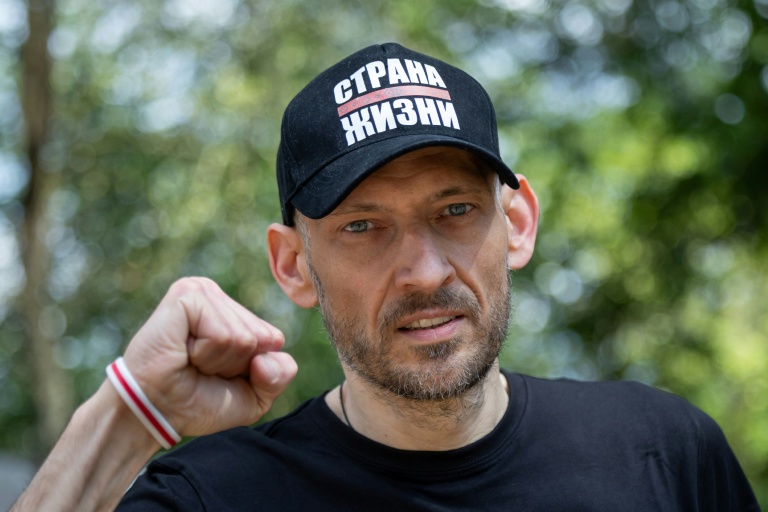From solitary confinement in a Belarusian prison, Sergei Tikhanovsky tried to piece together information on the outside world by listening to guards, inmates through the walls, and snippets of propaganda radio.
The popular opposition blogger, sentenced to 18 years in 2020 for daring to challenge Belarus’s long-time autocratic leader Alexander Lukashenko, was released in a surprise deal brokered by the United States last month.
He was kept isolated in a secretive prison system for most of his time behind bars and his family had no sign of life from him since March 2023.
“They told me I would die there. That everyone had forgotten about me,” a hollow-eyed but energetic Tikhanovsky — who lost half his body weight in prison — told AFP.
Three weeks after being released, he is adapting to being in “open spaces” after years in “cells when you can just about stretch your arms.”
Tikhanovsky spoke to AFP in an interview in a Polish forest near the Belarus border, where he had come for an opposition festival.
The 46-year-old — who looks much older — said he still does not know the full extent of the damage to his health.
“At one point, they were giving me two spoons of barley a day,” he said, detailing how he believes the KGB security service had tried to “break” him.
Instead, he has been “energised to the teeth” to fight Lukashenko — in power since 1994 — and help free the more than 1,000 political prisoners still in jail.
– ‘Totally alone’ –
Recalling his surprise release, Tikhanovsky said prison guards put a sack on his head, shoved him in a car and drove him to the capital Minsk, where he was handed to US diplomats and taken to freedom in EU member Lithuania.
He has had a lot to catch up on.
While locked up incommunicado, Russia invaded Ukraine, Donald Trump returned to the White House and thousands more Belarusians fled into exile, facing mass repression.
His wife, Svetlana Tikhanovskaya, became the country’s opposition leader after she stood in his place in the 2020 presidential election, a contest that intensified mass protests when rights groups and critics decried Lukashenko’s claim of victory as rigged.
In prison, the tightly-controlled state radio that was blasted out gave Tikhanovsky an idea of major events — but he did not have the full picture, and was blocked from getting family updates.
“I did not get a single letter. Not a single phone call … They did not let me see my lawyers. They told me nobody comes to see me and that there are problems with the post,” Tikhanovsky said.
He knew about Russia’s invasion of Ukraine — which he denounced as “catastrophic” — but only discovered much later that Moscow used Belarusian territory as a launching pad for the attack.
Rare opportunities to swap news with fellow prisoners came about during transfers to a freezing-cold “three-square-meter” punishment cell.
“There were 10 doors and a path in the middle… Sometimes, if it’s quiet, you can hear your neighbours,” he said.
“Some people had information, through censored letters, on the Ukraine-Russia war, on Belarusians abroad.”
Reading saved his sanity in the months spent alone. Chuckling, he recalled how he managed to ready some banned literature because the guards did not recognise it.
But squinting in the “semi-darkness” had destroyed his eyesight.
Asked when he was most scared, Tikhanovsky said it was while he was being tried in a makeshift court inside the prison: “You are totally alone.”
– ‘A person I did not know’ –
But for the ambitious and charismatic Tikhanovsky, the biggest readjustment has been the dramatic role reversal at home.
An unknown home-maker until 2020, his wife is now the country’s opposition leader and regularly tours Europe to meet Western leaders.
“At work, she is a person I did not know. I knew her as the person who held our home together,” Tikhanovsky said.
Even finding time to see her is tough due to her busy schedule, he said.
He suspects this dynamic is exactly why Lukashenko decided to free him.
“The KGB was convinced I would come out and disrupt the opposition.”
But Tikhanovsky — who called his wife the “legally elected president” — has vowed not to challenge her and to “strengthen” her position.
His priority is on trying to free the more than 1,000 political prisoners rights groups say are still behind bars.
There is a degree of unease, however, about the new balance of power in the household.
He has become the primary carer for their children — with his young daughter having not recognised him when he was freed.
He still hopes to have a “final say” on domestic issues, he said, smiling.
“I am getting used to it.”
oc/jc/yad
